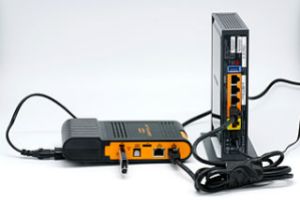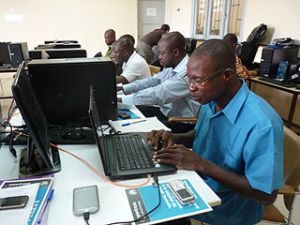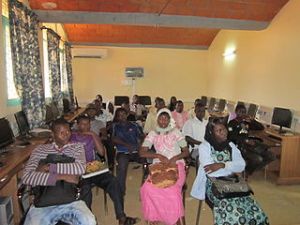(This is a guest post from Adrienne Alix of Wikimedia France. You can read the original Afripedia post here and you can read the French version of this post here.)
The Afripedia project was initiated in late 2011, and engaged Wikimédia France, the Agence Universitaire de la Francophonie (AUF) and the Institut Français (IF). Kiwix also supplied technological support.
The partnership, which was signed in June 2012, started materializing in November 2012 in Abidjan, Côte d’Ivoire.
What is the project about?
The Afripedia project aims to enable significant off-line consultation of Wikipedia and also to train contributors in French-speaking African schools and universities.

Our starting point was the fact that, although African universities have begun to be well-equiped with computer hardware, their Internet connectivity is often poor, or at least too weak or irregular to allow frequent, natural use of Wikipedia. These issues and lack of Internet access at home are factors that prevent students and teachers from using Wikipedia as much as they might like.
It was important for us to combine the dissemination of Wikipedia with contribution trainings so that students and teachers could contribute to Wikipedia and enhance content about Africa, which is notably under-represented on Wikipedia (only 2 percent of contributors are from Africa, and most of them from North African countries). Thus, when quality Internet access comes, Wikipedia contributors will be ready.
Using Kiwix, which has been offering off-line consultation of Wikipedia for several years, we implemented a computer deployment project to broadcast Wikipedia through offline WiFi networks. This mechanism, in place in universities of West Africa and Central Africa, allows people from those universities to connect easily to the network and freely read Wikipedia without an Internet connection or desktop computer. A more detailed description is available on Wikipedia: projet Afripédia.
What have we done?

With the help of AUF, we hired about 15 people from French-speaking digital campuses in 11 African countries: Senegal, Benin, Ivory Coast, Burkina Faso, Chad, Central African Republic, Mauritania, Niger, Togo, Mali and Burundi. From 5-9 November 2012, training took place at Abidjan’s French speaking digital campus, located in the Université Félix Houphouët-Boigny in Cocody (Ivory Coast). Over five days, we taught how to use and install the Wikipedia offline consultation tools. We also taught Wikipedia editing, explained concepts such as free licences and introduced the various Wikimedia projects. The week ended with a public lecture available to students (around a hundred people attended), and a contribution workshop animated by the people trained during the week.
These few days of training showed the need for developing best practices, which where not necessarily identified before. For example, the importance of a future offline export of Wikisource at the next content update would be very useful for accessing classical texts for French-language litterature teaching. There was also interest in an offline Wikipedia implemented directly on university servers, so that people who do not have WiFi access can consult the encylopedia on the university intranet.
We paid particular attention to the project follow-up, including the personal investment of each trainer, who has to master Wikipedia and the Wikimedia projects in order to teach these concepts efficiently to the local communities.
How far have we gotten two months later?
This report comes some weeks after the training in Abidjan in order to take a step back after the initial enthusiasm.

The situation is different depending on the country. For example, in Burundi and Abidjan, strikes in the university heavily slowed the implementation of the project in November. Elsewhere, however, installations and trainings were a success. In other countries, for planning reasons, the project will begin in January.
- For example in Chad, offline Wikipedia has been available since mid-November in the Campus Numérique francophone (CNF — French-speaking digital campus) of N’Djamena and trainings for the use of Wikipedia were organized by Francis Beninga Deouro, technical manager of CNF of N’Djamena.
- The same in Mali, where Michel Namar, manager of the CNF of Bamako, is leading an intensive action around the project: deployed it on the server of the Bamako University as well as in the Ecole Normale Supérieure of Bamako, Wikipedia is available through WiFi thanks to the plug-computers. Deployments are currently being organized in Segou (in central Mali).
- In Senegal, Stefano Mekoudi is having a strong presence promoting the project and sharing information, especially taking the opportunity given by the “Carrefour des Possibles” forum that was held in Dakar at the end of November 2012.
- Benjamin Sia, the person responsible for trainings at the CNF of Ouagadougou, Burkina Faso, established a system and created posters in both universities of the city to inform students of this new opportunity to consult Wikipedia. Training for contributors is scheduled in January.
- Thanks to Abdoul Kane’s work, the system has been installed on a server and at the IT department of the University of Nouakchott, Mauritania.
- Offline Wikipedia is also available in Niamey (Niger), thanks to Mariama Abdoul-Moumouni in the CNF and the university.
The first statistics about offline page requests and activity on Wikipedia are expected by mid-february.
Each trainer who attended the training in Abidjan in November is expected to become a regular contributor and also develop the contribution within their own university. The number of contributions was closely tracked for two month and first results are very encouraging:
- After Abidjan, 15 active contributors were identified thanks to the Afripedia project. By mid-January 58 contributors made at least a contribution to Wikipedia in addition to 71 new accounts created.
- Within a month, 233,700 bytes of text were published on Wikipedia, with around 600 distinct contributions. More than 85 articles were created, and more than a hundred modified.
- More than twenty pictures have been uploaded to Wikimedia Commons, illustrating mostly daily practices or architectural elements.
- Very few articles have been deleted thanks to kind and watchful support provided by more experienced contributors who acted as “Afripedia sponsors.”
- Contributions related to the project are available here: Projet Afripédia/Contenus
- Informations can also be tracked on twitter: @Afripedia
Conclusion
One month after the first deployment, and a little more than one year after the beginning of the project, we are pleased to note that it seems to have fulfilled its objectives.
- It meets a true need of accessing Wikipedia’s ressources online and offline, especially for some universities that do not have internet access—like those in Niger, for example.
- The CNF staff trained in Abidjan got really involved in the project, with both dissemination and contributions. Their energy when they came back to their respective countries indicates that the Afripedia project can be efficiently led from the CNF in Central Africa and West Africa.
- The training week in Abidjan brought out new ideas and improvements that we will try to implement shortly.
- The project was well-covered by the French speaking press (technology and Africa focus) and the bloggers from the Ivory Coast. It was also circulated to countries where we weren’t represented, raising great interest. For example, the CEDESURK network in the Democratic Republic of Congo (helped by Wikimedia France and Kiwix), is installing an off-line Wikipedia on its servers in the universities of Kinshasa and Lubumbashi, in advance of full deployment in the eight universities of the country and implementation of a training program.
A second step is necessary to expand the project to the countries of French-speaking Africa that aren’t part of Afripedia yet. This will probably take place in Spring 2013. It will also be an opportunity to review the project in further detail with the people who were already very involved, so as to facilitate Wikipedia access and expand African contributions to the Wikimedia projects.
Adrienne Alix, Wikimedia France
(Translation from French by Wikinade, Adrienne, PierreSelim, Mariiwakura, Seb35, and Chamatou)

Can you help us translate this article?
In order for this article to reach as many people as possible we would like your help. Can you translate this article to get the message out?
Start translation